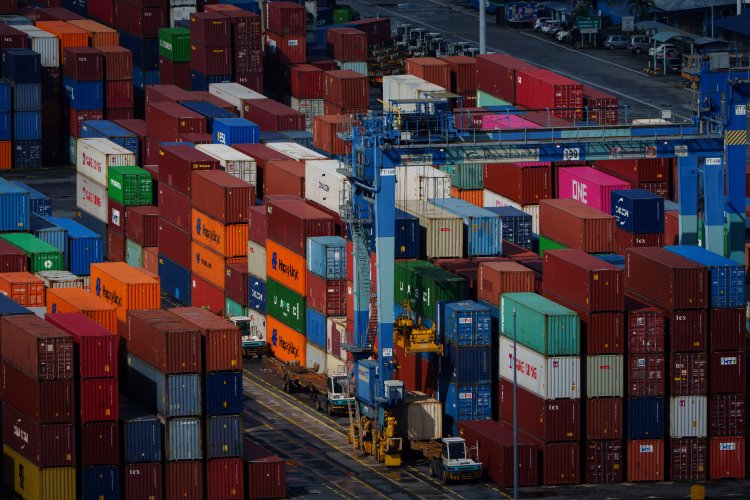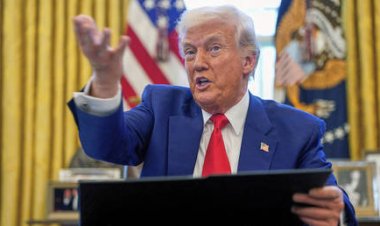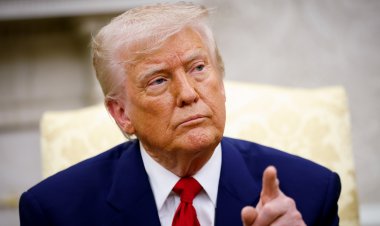MAGA Supporters Believe Trump's Trade War Will Yield a ‘pot of gold,’ Yet Their Patience Has Limits.
In light of potential economic downturns, a North Carolina GOP consultant emphasized, “If the economy just completely tanks, then it's Political Science 101 that the incumbent is in trouble.”

Currently, they are willing to give the president time to reshape the U.S. economy, even if it means dealing with higher prices resulting from significant tariffs on trading partners.
However, discussions with nearly three dozen Republican leaders and operatives across seven battleground states—ranging from party chairs to strategists and state lawmakers—indicate a rising concern that economic challenges could negatively impact the party’s chances in the midterm elections. While many express a commitment to endure the situation, some state party strategists and leaders estimate that voters will have a tolerance for increased prices that may last only until summer, while others believe the window could extend to about a year.
“No one is surprised, as Donald Trump has talked about unfair trade practices across the world for 30 years,” noted Wisconsin House Speaker Robin Vos, who has begun facing the effects of tariffs on his food packaging business. “He talked about reciprocal tariffs literally since the day he was elected. But the hope is that the idea of enacting the tariffs will result in zero at the end, and that's where I think most people are optimistic to hopefully get it done sooner rather than later.”
As Jonathan Felts, a GOP consultant from North Carolina observed, “If the economy just completely tanks, then it's Political Science 101 that the incumbent is in trouble.”
Felts acknowledged that “a lot of people are willing to shoulder some short term pain,” but he warned that “when early voting starts, if you're going to McDonald's and there's no dollar menu left, that's a problem.”
Trump’s trade policies have already unsettled both Washington and Wall Street, and now they are starting to take a political toll as well. His job approval ratings, previously over 50 percent when he took office, have since dropped. A recent Economist/YouGov Poll indicates that a majority of Americans believe the economy is worsening, reflecting a shift in public sentiment. The president is also clashing with Jerome Powell, the chair of the Federal Reserve, who warned that tariffs are likely to push prices higher.
Even among Republican voters—who have largely remained loyal to Trump despite criminal prosecutions, impeachment, and his 2020 loss—there are signs of potential vulnerability. The YouGov survey showed that 85 percent of Republicans approved of Trump’s performance, down 5 percentage points from the week prior.
This shift has not gone unnoticed by Republican leaders in key states. Yet, most of those who spoke to PMG report that the base continues to support the president’s agenda for now.
“I’ve just seen price increases under Biden for four years with no end goal, at least this time there's a method to the madness,” said Todd Gillman, a precinct chair for the Michigan Republican Party. “There's a pot of gold at the end of it.”
Republicans assert that the White House’s assertive stance on various issues, including trade, is what they endorsed.
Nevertheless, Gillman, who strongly backs Trump’s trade agenda, cautioned that if the economy does not show improvement within a year, “we’re going to get slack in the midterms.” Vos, who identifies as a “free trader,” expressed hopes that agreements will be reached before the end of Trump’s 90-day pause on reciprocal tariffs imposed on most U.S. trading partners.
This sentiment appears to be shared widely among local and state Republican leaders. Many referenced the White House’s claims of interest from over 100 counties in renegotiating trade deals with the U.S. as evidence of Trump’s strategy working and dismissed critiques of the administration’s approach as irresponsible.
Instead, they believe Trump has positioned the country for growth by breaking long-standing trade relationships and raising tensions with China. Their confidence persists even in light of potential backlash against tariffs in Congress and warnings from economists regarding price increases for essential items resulting from tariff implementations. They maintain that any current market volatility will stabilize and that prices, if they rise again, will soon revert to normal levels.
“If we can withstand ‘shock and awe’, it is my belief that the outcome will be very positive,” stated Alex McColman, chair of the Lee County Republican Party in Georgia. “Trump has a tough job and if all parties involved can join in, then we will win this chess match with countries that have been taking great advantage of the U.S.”
Many GOP leaders who discussed their views with PMG were hesitant to provide a timeline for economic improvement. They often attributed current economic difficulties to former President Joe Biden or other factors, asserting that the complexities involved make it unreasonable to expect swift resolution.
Moreover, numerous Republicans interpreted the recent decline in gas and egg prices as an indication that Trump is guiding the economy favorably, despite the fact those price changes were influenced by various external factors beyond the president's control, such as oil production fluctuations and outbreaks of bird flu.
“It's not like turning a canoe, it's like turning a battleship,” explained Michigan Republican Party Chair Jim Runestad. “So it's not as simple as one lever is going to make all these changes. They're going to give him a big breadth of time to make sure that we fix this thing that is otherwise going to collapse.”
In Pennsylvania, Trump’s tariffs are seen as a beacon of hope for workers in the struggling steel industry, according to Pennsylvania state Sen. Greg Rothman, who characterized Trump’s actions against countries that dump steel into the U.S. as “worse than ripping a bandaid off.”
“Our industry has been dying for the last fifty years, so it was going to take sort of a more radical approach,” remarked Rothman.
For Jesse Willard, chair of the Decatur County Republican Party in Georgia, Trump’s promise to reinstate steep tariffs on foreign nations was a significant deciding factor in his vote for Trump. Employed in the defense manufacturing sector, Willard remains optimistic that Trump will rejuvenate the industry to its previous stature from when he began his career in the 1980s.
“In the short term it's going to be a little bit painful, but I’d much rather buy American than anything else,” he remarked.
Yet he acknowledged that the discomfort cannot be indefinite.
“If it takes six months, a year you may see a little bit of people grumbling a little,” Willard predicted. “But if it takes more than a couple of years, you're going to see people not being OK with that.”
Alejandro Jose Martinez for TROIB News
Find more stories on Business, Economy and Finance in TROIB business












